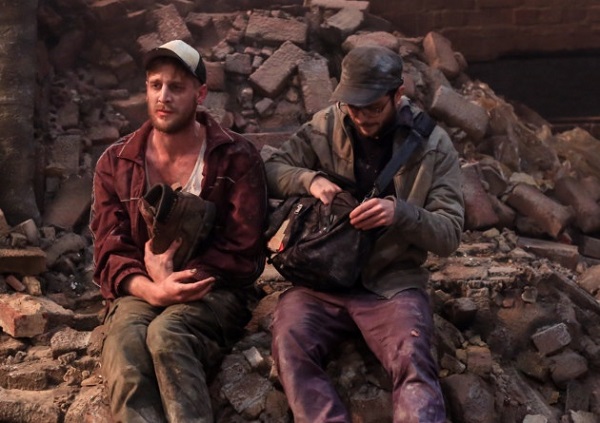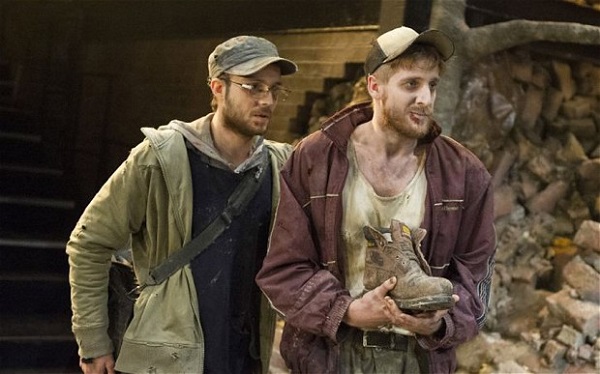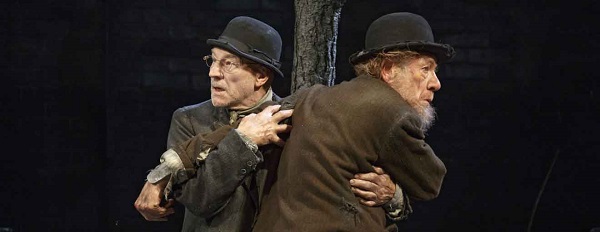Waiting For Godot by Totally Tom (2014) – A Theatre Review
Waiting for Godot (Arcola Theatre, UK, 2014)
London, summer evening, 2014. A string of buildings all bearing a similar name. Arcola Theatre. Enter into a dark space. In spite of the outside, this space gives the impression of effort. The set design is so real it leaps out of the walls. The chairs merely placed on the stage. The theatre torn apart from the inside? Couldn’t be. A dead tree rises from the bricks and a boot protrudes from an obscure part of the stage. Play opens. Silence… Da Na Na-na Na. Eventually the silence is broken. From behind us someone sings to himself. Again, silence. Broken again. Playfully an actor enters breaking the silence but emphasising it. This place is dead. This place is ruined. His clothes bear it. Like a desperate child he plays his game. Playing as if alone. But. From the dust of the broken ruins, the boot presents itself as alive. By deliberate mistake the actor produces the second character. Beaten and more ruined than the first. If one is desperate hope, the second is laid to waste. Tied to each other but against each other. This is Samuel Beckett’s famous work, re-imagined by youngsters. Modern audiences, modern days. Bleak. Critical. Lost. The same but terribly different. Should anyone expect the same reproduction? This production works as a comparison piece to the original text. Something new is to be said by using the source material and what new things can be done?
Waiting for Godot is a contemporary 20th century play and yet the play today by Totally Tom is very different to the original. Where, as the original took to the stage with the likes of Look Back in Anger (A. John Osborne UK 1956), this addition deals with the disillusioned youth and not the hopeless aged. It’s interesting to establish this comparison but many might loose the deeper messages with the more sillier moments. the youth are interested in entertaining each other in the midst of bleak surroundings – a bit like La Haine (d. Mathieu Kassovitz France 1995). Such a depiction combines the silliness of childlike entertainment with their bleak future. A certain tragedy, if we feel this is what our future is, going desperately on, clawing for meaning and clawing at things just to pass time. Some may offer that they lack the maturity to contemplate life properly and something has to be said for the aged men who look back on their lives in the original. However, in this instance, the boys have this weight of justifying their existence thrust upon them. Under pressure, they are pained, they grab at meaning, desperately search for leadership and just to get through it they rely on entertainment. Idle but not without implication. A lot goes on in their pained heads.
In the rise of cinema, theatre had to change. Crossing mediums at times but by definition theatre always has the possibility to interact with its audience. This contemporary depiction utilises this ability to great comic affect, never to involve the audience like a pantomime, but the odd connection with the audience works to the Absurdist Humour. The way in which this play utilises its relationship with the audience is both fitting and entertaining. It helps with the immersion to occasionally refer to the audience which the actors do well, always seeking laughs in the process.
This performance was an interesting take on this classic play. The youth taking a new stance on the subject matter. In spite of all the differences the play is still as powerful and just as humorous and the play being for young adults works better than one might think. Overall this is definitely a play to see. The performance I attended made note to say it was being recorded, I can’t be sure if it’ll work just as well on film but one can hope and it should certainly give an impression of what the experience was like in the flesh.
Synopsis
Vladimir and Estragon find themselves in an apocalyptic-esque environment, where they decide to wait for a man called Godot next to a dead-looking tree. They encounter some rather strange characters as they wait and slowly learn that life is repetative.
Further Reading
Waiting For Godot (a. Samuel Beckett Faber & Faber 2006)
Why Are We Still Waiting For Godot?
Beckett Directs Beckett – Waiting For Godot Part 1
Beckett Directs Beckett – Waiting For Godot Part 2
A First Look at Waiting For Godot (With Ian McKellen and Patrick Stewart)
Conversations with Sir Ian McKellen and Sir Patrick Stewart











Leave a Reply